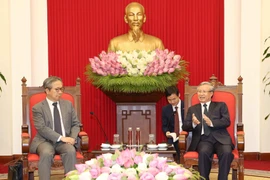Nakajima said the Japanese Government has launched aprogramme to help Japanese firms diversify their supply chains in ASEAN member countries.As many as 30 enterprises have registered for the programme, 15 of them want toopen factories in Vietnam, he added.
Due to the far-reaching effects of the COVID-19 pandemicworldwide since February, the supply chains for the automobile, mobile phoneand machinery industries have been disrupted, resulting in a shortage of components,he elaborated.
The Japanese Government is encouraging companies todiversify their supply chains to avoid dependence on a single market, he said,adding that each business joining the programme will receive a maximum grant of5 billion JPY (47 million USD).
Explaining the reason why Vietnam is attractive to Japanesefirms, Nakajima said the Vietnamese Government’s dedicated effort to drawJapanese capital is a crucial factor.
Another Vietnam’s advantage is the fact that a large numberof its workers are fluent in Japanese language though those from Malaysia andthe Philippines have better English skills.
According to the JETRO official, a 95 million population alongwith improving living conditions will soon turn Vietnam into an attractivemarket. Apart from exports, Japanese goods made in Vietnam could also cater tothe host country.
However, he also noted that as Vietnam’s labour and landlease costs have been rising over the years, it will gradually soon loselow-cost advantages. Moreover, the country also should develop its supportingindustry to raise the rate of locally-made products./.





























